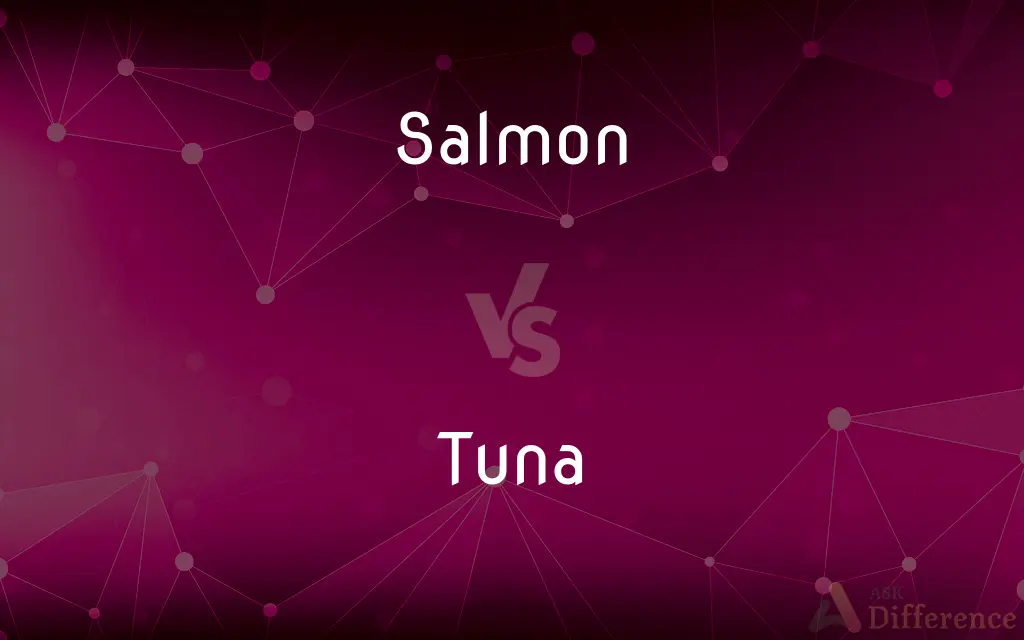Salmon vs. Tuna — What's the Difference?
By Tayyaba Rehman — Updated on October 30, 2023
Salmon and Tuna are both popular fish with distinct flavors. Salmon is typically pink and originates from both freshwater and saltwater, while Tuna is deeper red or pink and is primarily saltwater.

Difference Between Salmon and Tuna
Table of Contents
ADVERTISEMENT
Key Differences
Salmon, a common name for several species of fish, is primarily associated with the North Atlantic and Pacific Ocean. Tuna, on the other hand, refers to several species that belong to the Thunnini tribe, and they mostly inhabit warmer saltwater regions. Both fishes are extensively consumed worldwide and are pivotal in global fisheries.
Salmon is recognized for its distinctive pink to reddish-orange flesh, a result of its diet which includes organisms like krill. Tuna displays a spectrum of colors from deep red to pink, depending on the specific type; this color is because of the higher myoglobin content in its muscles. Both Salmon and Tuna are rich in omega-3 fatty acids, but their tastes are distinctly different.
Salmon often traveling thousands of miles upstream to spawn in the very same freshwater location where they hatched. Tuna, however, are known for their vast transoceanic migrations, covering immense distances in the open sea. Both Salmon and Tuna have become symbols of endurance and persistence due to these migratory habits.
Another significant difference is in their commercial value and consumption. Salmon is widely farmed, with aquaculture playing a significant role in meeting the global demand for this fish. Tuna, however, is primarily wild-caught, leading to concerns about overfishing for certain Tuna species. Both Salmon and Tuna have unique culinary uses; Salmon is often smoked or baked, while Tuna, especially the Bluefin variety, is a favorite in sushi and sashimi dishes.
Lastly, while both fishes hold cultural and economic importance globally, their roles differ. Salmon has cultural significance among indigenous communities, especially in North America, due to its role in traditional diets and myths. Tuna, being more widespread, holds a central place in various maritime cultures, often celebrated for its speed, strength, and value in trade.
ADVERTISEMENT
Comparison Chart
Syllables
Two (Sal-mon)
Two (Tu-na)
Origin of Word
From Latin "salmo", meaning "to leap"
From ancient Greek “thýnnos”, meaning "tunny fish"
Grammatical Use
Noun (common noun)
Noun (common noun)
Plural Form
Salmons (less common, typically just "Salmon")
Tunas
Sample Sentence Use
"The Salmon swam upstream."
"The Tuna was caught in the deep sea."
Compare with Definitions
Salmon
A fish primarily from the North Atlantic and Pacific Oceans.
The Salmon population has been decreasing in recent years.
Tuna
A large, fast-swimming fish mostly found in warmer saltwater regions.
Tuna is a primary target for many commercial fishing operations.
Salmon
An important component in the diets of many indigenous peoples.
Native tribes celebrate the annual return of the Salmon.
Tuna
A symbol of strength and speed in the marine world.
The Tuna can swim at speeds up to 75 miles per hour.
Salmon
A pinkish-orange color resembling the flesh of the Salmon fish.
She wore a Salmon-colored dress to the party.
Tuna
A popular meaty fish used in sushi and sashimi dishes.
Bluefin Tuna is one of the most sought-after fish in Japan.
Salmon
A key ingredient in many culinary dishes, smoked or baked.
Smoked Salmon is a popular breakfast choice with bagels.
Tuna
A canned product widely available in supermarkets.
She added canned Tuna to her salad for extra protein.
Salmon
A symbol of endurance and migration due to its life cycle.
The journey of the Salmon is one of nature's wonders.
Tuna
An important species concerning global overfishing concerns.
Conservationists warn about the declining numbers of certain Tuna species.
Salmon
Salmon is the common name for several species of ray-finned fish in the family Salmonidae. Other fish in the same family include trout, char, grayling, and whitefish.
Tuna
A tuna is a saltwater fish that belongs to the tribe Thunnini, a subgrouping of the Scombridae (mackerel) family. The Thunnini comprise 15 species across five genera, the sizes of which vary greatly, ranging from the bullet tuna (max.
Salmon
A large edible fish that is a popular sporting fish, much prized for its pink flesh. Salmon mature in the sea but migrate to freshwater streams to spawn.
Tuna
Any of various often large scombroid marine food and game fishes of the genus Thunnus and related genera, several of which, including albacore and skipjack tuna, are commercially important sources of canned fish. Also called tunny.
Salmon
Any of a number of fishes resembling the salmon.
Tuna
Any of several related fishes, such as the bonito.
Salmon
A pale pink colour
Ceanothus-clad walls of salmon brick
Cotton checked throw in cream and salmon pink
Tuna
The edible flesh of tuna, often canned or processed. Also called tuna fish.
Salmon
Any of various large salmonid food and game fishes of the genera Oncorhynchus and Salmo of northern waters, having pink or red flesh and characteristically swimming from salt to fresh water to spawn.
Tuna
Any of several prickly pears, especially O. ficus-indica, widely cultivated for its edible red fruit.
Salmon
The flesh of a salmon, used as food.
Tuna
The edible fruit of any of these cacti. Also called cactus pear.
Salmon
A yellowish pink to light or reddish orange.
Tuna
Any of several species of fish of the genus Thunnus in the family Scombridae.
Salmon
One of several species of fish, typically of the Salmoninae subfamily, brownish above with silvery sides and delicate pinkish-orange flesh; they ascend rivers to spawn.
Grilled salmon
Salmon paté
Salmon steak
Tuna
The edible flesh of the tuna.
Salmon
A meal or dish made from this fish.
Tuna
The prickly pear, a type of cactus native to Mexico in the genus Opuntia.
Salmon
A pale pinkish-orange colour, the colour of cooked salmon.
Tuna
The fruit of the cactus.
Salmon
The upper bricks in a kiln which receive the least heat.
Tuna
The Opuntia Tuna. See Prickly pear, under Prickly.
Salmon
(Cockney rhyming slang) snout (tobacco; from salmon and trout)
Tuna
Any one of several species of large oceanic fishes belonging to the mackerel family Scombridae, especially the bluefin tuna (Thunnus thynnus, formerly Orcynus thynnus or Albacora thynnus), called also the common tunny or great tunny, a native of the Mediterranean Sea and of temperate parts of the Atlantic Ocean. It sometimes weighs a thousand pounds or more, and is caught commercially in large quantity for use as food; - also called, especially in Britain, tunny. It is also one of the favorite fishes used by the Japanese in preparing sushi. On the American coast, especially in New England, it is sometimes called the horse mackerel. Another well-known species is the yellowfin tuna (Thunnus albacares) of warm seas. the See Illust. of Horse mackerel, under Horse.
Salmon
Having a pale pinkish-orange colour.
Tuna
The bonito, 2.
Salmon
To ride a bicycle the wrong way down a one-way street.
Tuna
The meat of the tuna, used as food; - also called tuna fish.
Salmon
Any one of several species of fishes of the genus Salmo and allied genera. The common salmon (Salmo salar) of Northern Europe and Eastern North America, and the California salmon, or quinnat, are the most important species. They are extensively preserved for food. See Quinnat.
Tuna
Tropical American flat-jointed prickly pear; Jamaica
Salmon
A reddish yellow or orange color, like the flesh of the salmon.
Tuna
Important warm-water fatty fish of the genus Thunnus of the family Scombridae; usually served as steaks
Salmon
Of a reddish yellow or orange color, like that of the flesh of the salmon.
Tuna
Any very large marine food and game fish of the genus Thunnus; related to mackerel; chiefly of warm waters
Salmon
Any of various large food and game fishes of northern waters; usually migrate from salt to fresh water to spawn
Tuna
New Zealand eel
Salmon
A tributary of the Snake River in Idaho
Salmon
Flesh of any of various marine or freshwater fish of the family Salmonidae
Common Curiosities
Are Salmon and Tuna both saltwater fish?
Salmon live in both freshwater and saltwater, while Tuna is primarily a saltwater fish.
Which fish is more commonly found in sushi, Salmon or Tuna?
While both can be found in sushi, Tuna, especially Bluefin, is a sushi favorite.
Do both Salmon and Tuna have significant cultural importance?
Yes, Salmon holds importance in North American indigenous cultures, while Tuna is valued in various maritime cultures.
What's the primary habitat of Salmon?
Salmon are anadromous, starting in freshwater, migrating to the ocean, then returning to freshwater to spawn.
Are both Salmon and Tuna rich in omega-3s?
Yes, both Salmon and Tuna are excellent sources of omega-3 fatty acids.
Is Salmon mostly farmed or wild-caught?
While wild-caught Salmon exists, a significant portion of Salmon available is farmed.
Are Tuna fish fast swimmers?
Yes, some Tuna species can swim at speeds up to 75 miles per hour.
Which is pinker, Salmon or Tuna?
Salmon typically has a pink to reddish-orange flesh, while Tuna can range from deep red to pink.
Which is larger, Salmon or Tuna?
While sizes vary, Tuna, especially species like the Bluefin, are generally larger than Salmon.
Is the word Salmon ever used to describe a color?
Yes, Salmon can refer to a pinkish-orange color resembling the fish's flesh.
What concerns surround Tuna fishing?
Overfishing, especially of certain Tuna species like Bluefin, is a major concern.
How is Tuna typically preserved for commercial sale?
Tuna is often canned, but it's also sold fresh or frozen.
Which has a longer migration, Salmon or Tuna?
While both have impressive migrations, Tuna are known for their vast transoceanic journeys.
Is it correct to say "Salmons" when referring to multiple Salmon fish?
While "Salmons" can be used, it's less common; "Salmon" can refer to both singular and plural.
Are there different species within the categories of Salmon and Tuna?
Yes, both Salmon and Tuna refer to multiple species within their respective groups.
Share Your Discovery

Previous Comparison
Full vs. Partial
Next Comparison
Paid vs. LaidAuthor Spotlight
Written by
Tayyaba RehmanTayyaba Rehman is a distinguished writer, currently serving as a primary contributor to askdifference.com. As a researcher in semantics and etymology, Tayyaba's passion for the complexity of languages and their distinctions has found a perfect home on the platform. Tayyaba delves into the intricacies of language, distinguishing between commonly confused words and phrases, thereby providing clarity for readers worldwide.














































